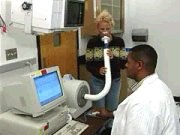Frequent Questions about EPA Clinical Studies
On this page:
- What should I expect after I contact the EPA Recruiting Office?
- What will I be asked to do?
- Are the studies safe?
- Are there any risks?
- What is spirometry?
- What is methacholine challenge?
- What is bronchodilator reversibility?
- What is a heart rate monitor?
- What is a sputum sample?
- What is a brachial artery ultrasound?
- What is a bronchoscopy?
- What if I sign up and change my mind about participating?
- Will I get paid? How much?
- Are there any restrictions on who can participate?
- Where do the studies take place?
- How much of my time will participating in a study require? During what hours?
- How does my participation help protect my health and the health of the planet?
What should I expect after I contact the EPA Recruiting Office?
First we will ask you some questions over the telephone about your general health. In most cases we will ask you to come to the Recruitment Office to complete a medical history form. The appointment will take about an hour. Some studies will require other testing, such as blood tests and spirometry exam.
Next you will be scheduled for a physical examination at the EPA Medical Station. This exam is free and you will be paid for your time completing the medical history form and having the physical exam.

About a week after your physical exam, we will contact you to tell you about the studies for which you qualify. You can sign up for any of the studies for which you qualify, or you can choose not to sign up for any.
What will I be asked to do?
Some studies only involve a simple blood donation and others are more complex and time consuming. Many are done in rooms with safe levels of carefully controlled air mixtures of different air pollutants. You might be asked to breathe into special instruments or to exercise on a bicycle or treadmill. People of all levels of fitness can participate. More details about what you may be asked to do are in the Studies Opportunities section.
Are the studies safe?
Everyone involved in the research conducted at the Human Studies Facility puts safety first, last and always. One of the main duties of the EPA screening of volunteers is to make sure no one is at undue risk to participate in research. In addition:
- Each study has eligibility requirements, many of which are for your safety.
- In all phases of the process from initial screening to study participation, we provide a detailed written description of what the screening, physical exam, or study involves. This document is the informed consent. We ask you to read it, ask as many questions about the study as you like, and sign it to confirm that you understand before beginning the study.
- Before enrolling any participants, all research studies are reviewed by the UNC School of Medicine Office of Human Research Ethics. This review ensures compliance with all Federal and State regulations for safe, ethical, and fair treatment of research participants.
Are there any risks?
Most experiments at the Human Studies Facility involve common air pollutants like diesel exhaust, ozone, or concentrated air particles from car exhaust. Amounts are generally no more than people encounter in a large city such as Los Angeles, New York or Mexico City on a smoggy day. Certain procedures such as spirometry, heart rate monitoring, or bronchoscopy may be required depending on the study. Risks will be explained and given to you in writing and you can ask questions before the study begins. If you are uncomfortable, worried, or scared at any point during the study, you may stop participating at any time.
What is spirometry?
Spirometry (spi-ROM-eh-tree) measures how much and how fast you can move air into and out of your lungs. During the test, a technician will ask you to take a deep breath in and then blow into a mouthpiece connected to a small machine called a spirometer.

You'll blow out as hard and as fast as you can until your lungs feel absolutely empty. The test is repeated three times. The entire procedure lasts about 10 minutes and has minimal risk. Some people will feel light-headedness for a few minutes afterward.
What is methacholine challenge?
Methacholine challenge is a standard clinical test used to determine airway reactivity in patients with known or suspected asthma, or in research to confirm that asthma does not exist in normal, healthy people. During this test you will inhale a fine spray of a medicine (methacholine) in increasing doses in an attempt to produce a change in your lung function test results. You will perform spirometry before and after each treatment. If you become uncomfortable during the test or develop wheezing, you may be given an inhaled bronchodilator (Albuterol, a drug that helps to open your airways). You will be asked to avoid caffeine on the day of the test.
What is bronchodilator reversibility?
If you have asthma and are having this test done, you will be asked not to use your Albuterol inhaler for 8 hours before the test and to avoid caffeine on the day of the test. Spirometry will be done first, and then you will be given 4 puffs of Albuterol and then spirometry will be done again about 20 minutes later.
What is a heart rate monitor?
Studies may include different types of heart rate monitoring. Some studies include placing several electrodes on your chest to record your heart rate and beat only during the time you are being exposed to carefully controlled amounts of air pollutants in our chambers. Other heart rate monitors are portable devices about the size of a deck of cards with several electrodes attached to your chest. You will wear this type of monitor during your daily activities. It records your heartbeat continuously and allows us to analyze your heartbeat variability (HRV) over a 24 hour period. Although this may seem cumbersome, it can be concealed easily under your clothing.
What is a sputum sample?
Sputum is a name for the mucous that normally coats your lungs. Sputum contains various cells and proteins that can help researchers understand the effects pollutants have on your body. To provide a sputum sample, you will be asked to rinse out your mouth with water and then breathe in salt water mist. This loosens the mucous and allows you to force a cough to spit the sputum into a cup. The procedure takes about 15 minutes or less.
What is a brachial artery ultrasound?
A brachial artery ultrasound (BAU) uses sound waves (ultrasound) to measure changes in the size of a large artery in your upper arm. An ultrasound transducer (a wand-like device that produces sound waves) is placed against your upper, inner arm and the size of your brachial artery is painlessly measured while a blood pressure cuff is being inflated and deflated on your arm.
What is a bronchoscopy?
A bronchoscopy (bron-KOS-ko-pee) is used to get a lung cell sample. During the procedure, a doctor passes a thin tube through your nose and throat into the airways. Cells are removed either by a squirt of salt water or a gentle brushing. Before inserting the tube, the doctor will give you anesthetic to numb your nose and throat. You will get an intravenous (IV) line placed in your vein in case you need medications or fluids. After the procedure, nurses will monitor your heart rate and blood pressure. The bronchoscopy itself usually lasts about 30 minutes. But the entire procedure, including preparation and recovery time, takes about 4 hours.
Bronchoscopy is usually a safe procedure. After the test, you may have fatigue, a sore throat or hoarseness for several hours. There's a small risk of a drop in your oxygen level during the procedure, minor bleeding, or developing a fever. All known risks of the procedure will be discussed in detail with potential study volunteers. We ask that you stay in the Chapel Hill area for 24 hours as a precaution, in case there are complications.
What if I sign up and change my mind about participating?
You can stop participating at any time without penalty. We understand that people can change their minds. You will be paid for the portion of the study that you finish.
Will I get paid? How much?
You will be paid at various times throughout the study from the initial screening to completion of the study. Amounts range from $50 to well over $1000 for completing a study. In addition, you will be reimbursed for travel and parking expenses.
Study participants who refer other people may also be paid for this referral. For every referral who qualifies we will pay you $10 for healthy people and $20 for special populations.
Are there any restrictions on who can participate?
Yes, each study has certain, and sometimes very specific, enrollment criteria. After you contact us, we will help guide you to studies for which you may qualify. You may also review study criteria in the Studies Opportunities section.
Where do the studies take place?
Most studies take place at the Human Studies Facility on the UNC-Chapel Hill campus. Here are directions to the EPA Clinical Studies building, which is located close to the UNC Hospital at 104 Mason Farm Road. Other studies may take place at your home, during your commute, or during your work day.
How much of my time will participating in a study require? During what hours?
Studies vary greatly in length and complexity. Your time may be required for as little as one hour to 30 hours over several weeks. Studies are usually conducted between 8am and 5pm Monday through Friday.
How does my participation help protect my health and the health of the planet?
Thanks to people like you who have participated in studies at the Human Studies Facility, the EPA has set air pollutant regulations that help improve the health of millions of individuals every year. Your participation will help make the world a better and healthier place for us all.

